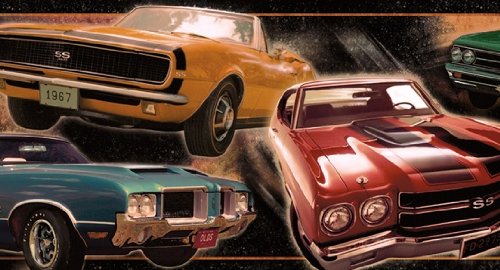Muscle Car Wallpaper Border Definition
Source (google.com.pk)Several North American vehicles, the Chevrolet El Camino, Ford Ranchero, Dodge Rampage, Honda Ridgeline and Subaru Baja have beds, but they are not usually referred to as pickups in North America, because their design and construction does not conform to normal expectations of "trucks". Although the El Camino and the Ranchero were built with body-on-frame architectures, they were based on existing station wagon platforms, while the Ridgeline uses a spot welded sheet steel monocoque (unibody) chassis in the same style as modern passenger cars. Trucks typically have either a tubular or channel rail chassis with a fully floating cab and separate cargo section to allow for chassis flex and prevent warping of the sheetmetal. The sheet steel in both of these sections is not a stressed member.
A combination of the two styles, monocoque cab and engine bay welded to a 'C' section chassis rear is commonly used for trucks (such as the Mercedes-Benz Sprinter chassis cab), but has not been common in North America. For instance, when offered in Australia it is known as the 'one tonner' because it is rated to carry some 250 kg (551 lb) more than the all monocoque style.[citation needed]
In Australia and New Zealand vehicles like the Holden Ute, Ford Falcon Ute and trayback vehicles which might be known as "pickups" elsewhere (such as the Toyota Hilux) are colloquially called utes.
In Romania they are known as a "slipper", in Egypt a "half truck" and in Israel a tender.
Panel vans, popular in Australia during the 1970s were based on a ute chassis; known in Egypt as a "box".[citation needed] Coupé utilities and panel vans usually have an integral cargo bed behind the cabin with unibody or monocoque construction like automobiles.
The design details of such vehicles vary significantly, and different nationalities seem to specialize in different styles and sizes of vehicles.
A 1928 Ford roadster pickup with step-side or well-body
1937 Plymouth PT-50 with step-side or well-body priced at US$525.The first factory-assembled pickup was based on the Ford Model T car, with a modified rear body. It debuted in 1925 and sold for US$281. Henry Ford billed it as the "Ford Model T Runabout with Pickup Body." The 34,000 built that first year featured a cargo box, adjustable tailgate, four stake pockets and heavy-duty rear springs.
In 1928, the Model A replaced the Model T, introducing the first closed-cab pickup. It sported innovations like a safety glass windshield, roll-up side windows and three-speed transmission. It was powered by a four-cylinder L-head engine capable of 40 horsepower (30 kW).In 1932, Ford Australia was produced the first Australian "ute".
In 1932, the 65 horsepower (48 kW) Ford flathead V8 engine was offered as an option in the truck. By 1936, Ford had already produced 3 million trucks and led the industry in sales.
Muscle Car Wallpaper Border Free Wallpaper Pics Pictures Hd for Desktop Iphone Mobile HD 1080p

Muscle Car Wallpaper Border Free Wallpaper Pics Pictures Hd for Desktop Iphone Mobile HD 1080p

Muscle Car Wallpaper Border Free Wallpaper Pics Pictures Hd for Desktop Iphone Mobile HD 1080p

Muscle Car Wallpaper Border Free Wallpaper Pics Pictures Hd for Desktop Iphone Mobile HD 1080p

Muscle Car Wallpaper Border Free Wallpaper Pics Pictures Hd for Desktop Iphone Mobile HD 1080p

Muscle Car Wallpaper Border Free Wallpaper Pics Pictures Hd for Desktop Iphone Mobile HD 1080p

Muscle Car Wallpaper Border Free Wallpaper Pics Pictures Hd for Desktop Iphone Mobile HD 1080p

Muscle Car Wallpaper Border Free Wallpaper Pics Pictures Hd for Desktop Iphone Mobile HD 1080p

Muscle Car Wallpaper Border Free Wallpaper Pics Pictures Hd for Desktop Iphone Mobile HD 1080p

Muscle Car Wallpaper Border Free Wallpaper Pics Pictures Hd for Desktop Iphone Mobile HD 1080p

